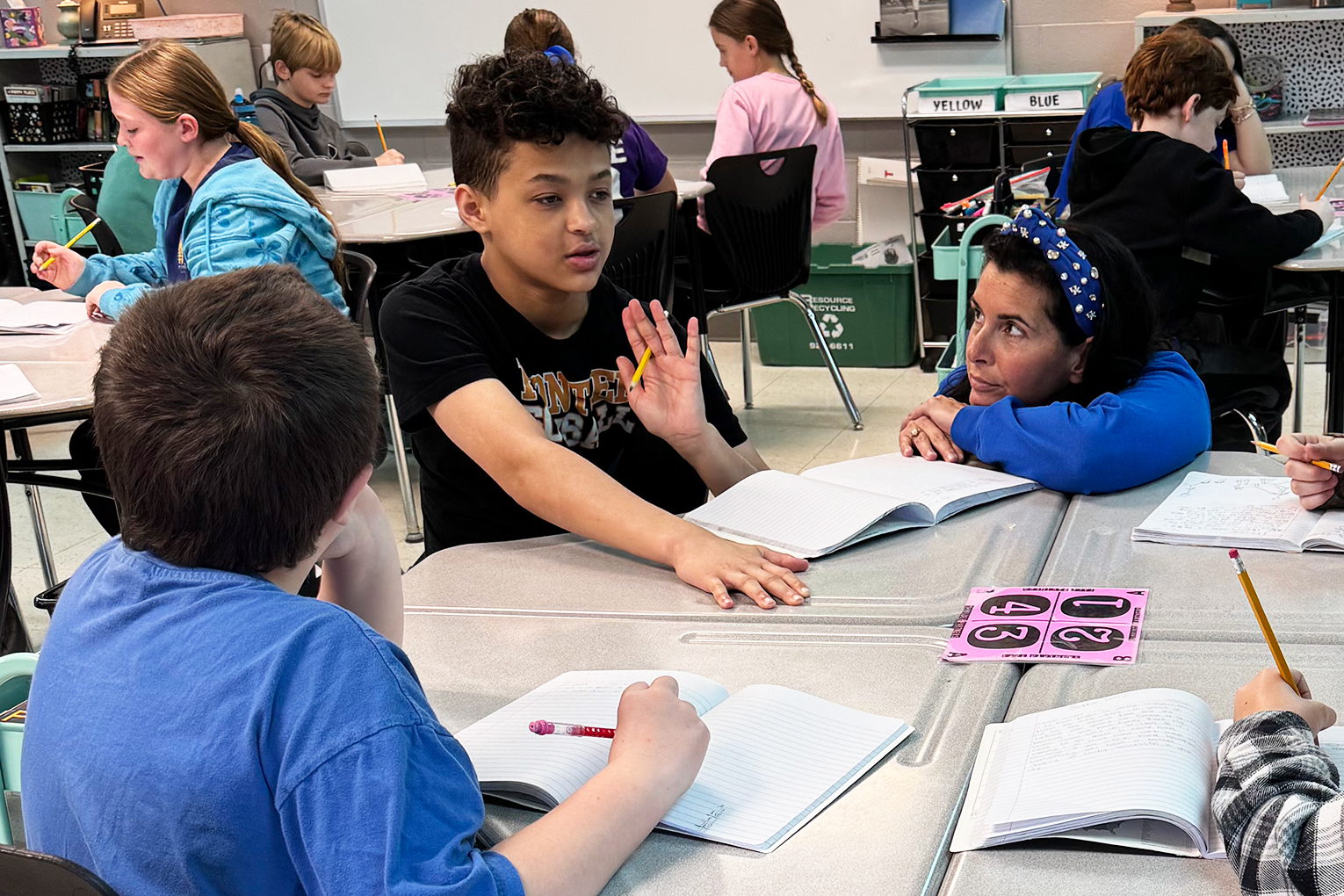
Courtney Turner, from left, Roshawn Brooks, Auggie Brown and Rosella Hayes practice their team presentations in Lisa Bartley’s AP Seminar class at Glasgow High School (Glasgow Independent). The course is the first of two courses in the AP Capstone program being taught at five Kentucky high schools.
Photo by Mary Fye
By Mike Marsee
michael.marsee@education.ky.gov
Stephanie Carter has come to terms with the fact that she is no longer always the smartest person in her classroom.
Carter’s students at McCracken County High School have taught her a great deal since she began teaching a course in AP Capstone, a program of Advanced Placement courses that helps students learn a skill set that will serve them well in college.
She prepares them to work on their own and as a group, then return to her with evidence-based essays and presentations that go far below the surface of an issue – and often far beyond what she knew or thought about that issue.
“The joy of it is that you get to learn new stuff every day with kids. And the pain of it is that you’re no longer the expert, you’re no longer the most informed person in the room,” Carter said. “I say I’m no longer the sage on the stage; I’ve become the guide on the side.”
AP Capstone was developed by the College Board as part of its Advanced Placement Program. It consists of two specific courses plus additional work, as described by the College Board:
- AP seminar, in which students examine all sides of an issue and cultivate their writing ability in order to develop, present and defend an evidence-based argument. The course teaches students to collect and analyze information. They are evaluated through a team project and presentation, an individual written essay and presentation, and a written exam.
- AP research, in which students develop the skills and discipline necessary to conduct independent research to produce and defend an academic thesis. Students dive into a topic of their own choosing and plan and conduct a year-long mentored, research-based investigation and are evaluated through a thesis of about 5,000 words and a presentation, performance or exhibition with an oral defense.
- Other AP courses of the student’s choosing.
Students typically take AP seminar as sophomores or juniors, followed by AP research, and they learn college-level skills before they leave high school.
“It’s modeled after undergraduate research projects,” said Mary Fye, who teaches AP

Reagan Bowles, left, prepares surveys as Chandler Dunn helps her sort the paperwork in Lisa Bartley’s AP Seminar class at Glasgow High School. Bowles’ survey, which will be given in English classes at the school, asks, “What is the correlation between anxiety and creativity in teenagers at Glasgow High School?”
Photo by Mary Fye
research at Glasgow High School (Glasgow Independent). “What my students are doing is just beyond anything I did until my later years of undergrad or grad school.”
The AP Capstone program was introduced four years ago through a pilot program and is currently offered in five Kentucky high schools: duPont Manual (Jefferson County), Glasgow, Highlands (Fort Thomas Independent), McCracken County and North Oldham (Oldham County).
Schools must apply through the AP program to participate, and the College Board is currently accepting applications for the 2017-18 school year.
AP Capstone was developed in part through the work of a former Kentucky teacher and administrator – John Williamson, who is now the executive director of AP curriculum and content development – at the request of College Board Higher Education membership.
“Colleges were saying to the College Board that students had solid content – they knew their facts, they could do the math, they had their history down – but what they didn’t see was much independent thought or critical thinking,” Carter said.
Carter brought the program to Lone Oak High School in McCracken County in 2012.
“We had 21 students the first year. One is at Vanderbilt now, one is a Singletary Scholar at Kentucky, one just accepted a new security clearance from the Navy. All of them have gone on to do amazing things. They were well on their way to doing amazing things, but this program was kind of that extra lift to help them learn to think for themselves,” she said.
In that first year, students in Carter’s AP seminar class researched a city-county government merger ballot question and presented their findings to the Paducah mayor and McCracken County judge-executive.
“They determined it was not in the best interest of the county residents, but it would be in the area’s best interest in the long run. Despite what they’d learned, the students didn’t think the merger was likely to pass, and sure enough, it didn’t,” Carter said.
Where students often work together in AP seminar, they work on separate projects in AP research. Fye, who is teaching 11 seniors in the first year of that course at Glasgow High, helps them develop a topic and find mentors who are experts on the subject, then turns them loose.
“Watching them learning to be truly independent thinkers and researchers and gaining more confidence, that’s been a big thing,” she said. “I provide opportunities, I provide models, but I can’t mark on papers and tell them, no, they can’t do this. We’re trying to model exactly what they’re doing in college.
“If they waste a day of class time doing homework for another class, that’s time they’ve wasted.”
The AP research students are not entirely on their own, however.
“They all know what the others are doing and they will help each other. They know this is something that’s going to impact the rest of their years, and they’re mentoring each other,” Fye said. “But they’re all doing different things. It’s like managing 11 different classes, essentially.”
Therein lies the challenge for Fye, who has been teaching for 20 years and has taught AP English literature for seven years.
“It’s one of those invigorating classes,” she said. “Twenty years later, I’m still as excited to get to class as I ever was. I’m excited to see as their data comes in and they start connecting those dots. And they have such great ideas.”
“It’s interesting to see how they have dug deeper,” added Carter, who has taught AP English language for 10 years. “Most of the time, students just take what the surface says and there’s no space for that in this class. I tell them there has to be more than that.”
Carter is trying to make sure students understand that through her work on the AP Capstone advisory committee and the AP seminar curriculum and assessment development committee.
“One of the things we do is look at the students’ assessment task directions and the students’ samples to make sure what they’re giving us is what we’re asking for, and then we tweak what we’re asking to make sure the product is better for the students,” she said. “We want to make sure it’s easier to understand what the expectations are. The hard part should not be figuring out what you’re asked to do; it should be the thinking on the other side.”
It is hard work, and both Carter and Fye indicated that it isn’t for every student. But those who can meet the challenge are rewarded with more than just a good grade.
Since the consolidation of Lone Oak and two other schools into McCracken County High, students at the new school have explored real-world issues such as innovation, sustainability and technology.
“The learning curve is steep, but once they get it figured out, the skills we’re asking them to do are transferrable across content, across interest, across various career fields,” Carter said.
Fye said those are skills she wishes she could have had before going to college.
“I just keep thinking, ‘Why didn’t I have this when I was a student?’” she said. “I think it’s one of best things we can do to prepare them for college, and also to help them explore their own interests. What other class allows them to do their own research on something they’re interested in?”
MORE INFO …
Stephanie Carter Stephanie.carter@mccracken.kyschools.us
Mary Fye mary.fye@glasgow.kyschools.us




Leave A Comment